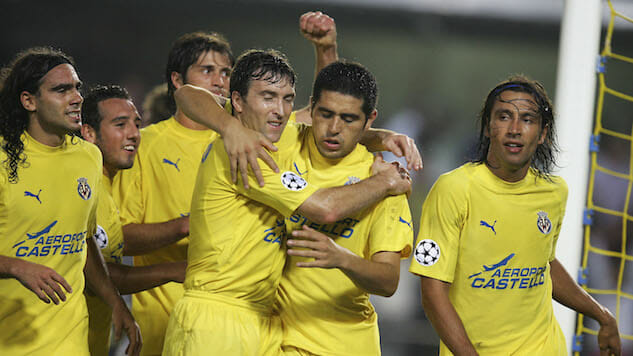
Before tiny Spanish club Eibar won your hearts, another plucky underdog threatened to upend the European club hierarchy: Villareal CF. Nicknamed “The Yellow Submarine,” the club from the province of Castellon has been around since 1923 and still plays in the same stadium, La Ceramica (formerly El Madrigal). The club didn’t taste the first division until 1998, but made a huge impression in La Liga in the early 2000’s.
This is the tale of their amazing 2006 season.
While Barcelona and Real Madrid normally rule the roost in Iberia, even the big clubs experience fallow periods. In the early 2000’s, as Valencia nicked a few La Liga titles, Barcelona struggled in the window after Cruyff’s “Dream Team” and before Riijkaard and Ronaldinho turned things around. At Real Madrid, Florentino Perez’s disastrous Galacticos policy coupled with Vanderlei Luxemburgo’s ineffective “magical boxes” made Real Madrid look pedestrian.
Meanwhile the little club in Castellon took a few risks, and they paid massive dividends. First, they signed an up-and-coming South American manager by the name of Manuel Pellegrini. The Chilean had experienced success in Argentina with River Plate, but was still an unknown quantity in Europe. Other South American coaches, notably Carlos Bianchi of Boca Jrs, had struggled to replicate club level success in Europe.
The rock at the heart of Villareal’s midfield was Marcos Senna, signed from small Brazilian club Sao Caetano in 2002. Senna struggled his first two years in La Liga and got little playing time, but blossomed in his third year.
Of course, Senna’s growth was aided by Villareal’s other two South American signings, cast aways from large clubs: Juan Roman Riquelme and Diego Forlan. FC Barcelona had signed Riquelme for 11 million euros, but Lous Van Gaal—the man who would later lead Manchester United to FA cup glory and Europa League qualification—did not rate Roman. Thus, Roman was loaned to the Yellow Submarine.
Diego Forlan’s time at Manchester United was unremarkable but for one infamous spat with Sir Alex Ferguson. The Scot had told Diego to wear a certain type of cleats because the wet field would be muddy. Diego failed to wear the cleats, slipped during the game, got berated in the locker room, and Sir Alex tossed the boots at him. After that, Forlan was more than happy to relocate to Spain, and while clubs there sometimes try the manguerazo, the normally sunny weather usually means dry and slip-free surfaces.
For Villareal, Diego Forlan was the mobile, fire hot tip of an attacking spear. He could spring the offside trap, play the one-two, finish with aplomb, and launch mortars from outside the box. Just check out this golazo:
He won the pichichi in 2005 for Villareal, and scored hat-tricks seemingly at will.
Forlan was greatly aided by the midfield artistry of Juan Riquelme. Roman is best described in the passive voice. He did not play soccer so much as the ball played through him. His feeling for the rhythms of the game, vision, and ability to string a pass to a teammate are legendary. He was no slouch in 2005 either. Or 2006.
Riquelme’s freekick skills were exceptional. He would always eye the keeper, shoot to the opposite side, and curve the ball up and over the wall. Well, almost always.
Manuel Pellegrini deserves credit for making all these moving parts fit together. Villareal played a triangle-passing 4-2-2-2 with Senna and Roman as center-mids, and the wide wingers pinching inside often to combine with Forlan or the other striker. This allowed the outside backs like Juan Pablo Sorin to bomb forward and attack.
Villareal enjoyed three excellent seasons, but 2006 was so memorable because of their Champions League run.
The summer before La Liga even started, they beat Everton 2-1 home and away to quality for the group stages. Then, despite being drawn into a group with Manchester United, they kept four clean sheets and finished first.
In the first knockout round, they tied Rangers both home and away, but scored two away goals in the first leg and advanced. In the quarterfinals, they scalped Italian giants Inter Milan thanks to Diego Forlan’s goal in the 2-1 first leg loss away from home. Only a single goal at home was needed for a semifinal date with English club Arsenal.
They lost the first leg by a single goal at then Highbury, and the draw rested on, as a Sky pundit would say, “a knife’s edge.” The game plodded along at 0-0 until, near the end, Villareal won a penalty kick. Juan stepped up to take it, knowing a goal would force extra time, and…
He sidefooted a weak effort barely to the left of Arsenal keeper Jens Lehman, who gratefully snagged it. And little Villareal, the improbable club that could, could no more…
And then things changed. Roman left and returned to Argentinian club Boca Jrs. Diego Forland was sold to Atletico de Madrid. Pellegrini was hired as coach of Real Madrid. Only Marcos Senna stuck around, winning a Euro Championship with Spain in 2008, but Villareal were relegated in 2012, but won promotion after only a single season in Segunda.
The Yellow Submarine is again closing in on the top clubs in Spain, but for one Spring in 2006, they were a penalty and perhaps a slice of luck from being the best team in Europe. Arsenal lost that UCL final to Barcelona, but Villareal may not have.